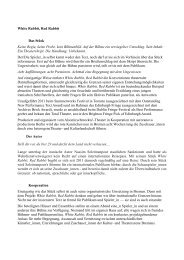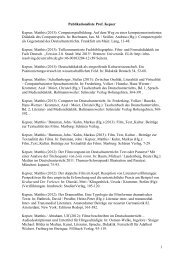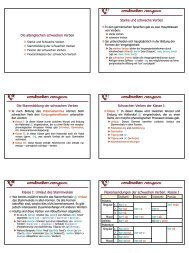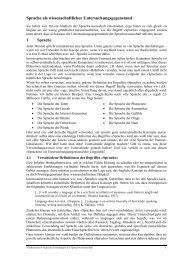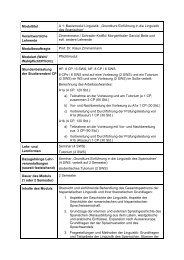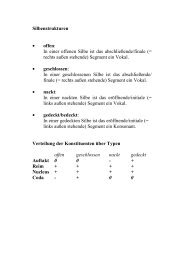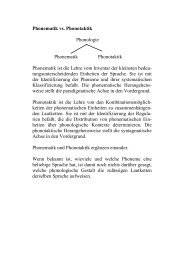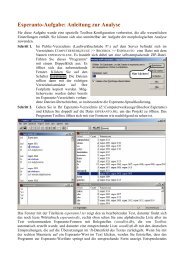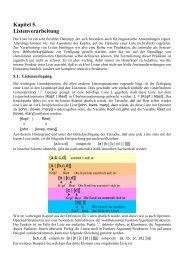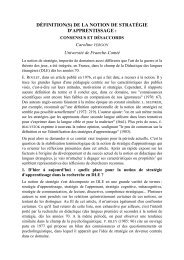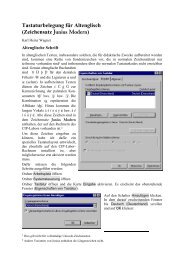Relativism and Universalism in Linguistics - Fachbereich 10 ...
Relativism and Universalism in Linguistics - Fachbereich 10 ...
Relativism and Universalism in Linguistics - Fachbereich 10 ...
You also want an ePaper? Increase the reach of your titles
YUMPU automatically turns print PDFs into web optimized ePapers that Google loves.
Section F: Phonology 71<br />
Despite the very rigorous methods <strong>and</strong> the often proven conclusions of French diachronic<br />
phonetics, there are many reasons to believe that the impact of other languages <strong>and</strong> substrata<br />
has been deeply underestimated, <strong>and</strong> that the system does not work completely by itself like a<br />
pendulum, directly from Lat<strong>in</strong> to French.<br />
This paper aims at analyz<strong>in</strong>g some cultural explanations of this lat<strong>in</strong>ocentrism, <strong>and</strong> at show<strong>in</strong>g<br />
some relevant cases which challenges the diachronic phonetic system by imply<strong>in</strong>g the impact<br />
of other languages than Lat<strong>in</strong>. The examples of the words “oiseau”, “chien” <strong>and</strong> “gauche” are<br />
more specifically analyzed.<br />
The universality of <strong>in</strong>tonation:<br />
some common <strong>and</strong> language specific patterns <strong>in</strong> <strong>in</strong>terrogative<br />
<strong>in</strong>tonation<br />
Ramírez Verdugo, Mª Dolores / Astruc-Aguilera, Lluïsa / Morán, Mª Berta<br />
Universidad Autónoma de Madrid / The Open University <strong>in</strong> the East of Engl<strong>and</strong> / Universidad<br />
Complutense de Madrid<br />
dolores.ramirez@uam.es;luisa@astruc.<strong>in</strong>fo;bmoran@arrakis.es<br />
Intonation is a complex l<strong>in</strong>guistic system that <strong>in</strong>teracts with grammatical, pragmatic <strong>and</strong><br />
affective levels of language description (Halliday 1994; Snow <strong>and</strong> Balog 2002). The<br />
underst<strong>and</strong><strong>in</strong>g <strong>and</strong> <strong>in</strong>terpretation of the pragmatic mean<strong>in</strong>g of spoken discourse largely<br />
depends on the choice of <strong>in</strong>tonation patterns (cf. Pierrehumbert <strong>and</strong> Hirschberg, 1990;<br />
Couper-Kühlen <strong>and</strong> Selt<strong>in</strong>g, 1996; Brazil, 1997; or Wichmann 2000). However, even though<br />
<strong>in</strong>tonation could be regarded as one of the universal resources available to express mean<strong>in</strong>g <strong>in</strong><br />
many languages, “the system of <strong>in</strong>tonation <strong>and</strong> the <strong>in</strong>teraction between <strong>in</strong>tonational <strong>and</strong><br />
lexico-grammatical form varies from language to language (Bol<strong>in</strong>ger, 1986; Cruz-Ferreira,<br />
1987: <strong>10</strong>3; Ladd, 1996: 113; Hirst & Di Cristo, 1998). This variation often leads to difficulties<br />
<strong>in</strong> the acquisition of L2 <strong>in</strong>tonation, ma<strong>in</strong>ly due to the unsatisfactory overuse of a very limited<br />
variety of patterns <strong>in</strong> the foreign language (Ramírez Verdugo 2002, 2003, 2005, 2006;<br />
Ramírez Verdugo <strong>and</strong> Romero Trillo, 2005). Any slight change <strong>in</strong> <strong>in</strong>tonation, which <strong>in</strong>itially<br />
may appear to be <strong>in</strong>significant, implies some changes <strong>in</strong> the semantics <strong>and</strong> pragmatics of the<br />
f<strong>in</strong>al message as perceived by <strong>in</strong>terlocutors (Kelm 1995: 435). Furthermore, it seems that<br />
while mistakes <strong>in</strong> the pronunciation of segmental sounds are generally overlooked at, deviant<br />
<strong>in</strong>tonation patterns may affect comprehension negatively <strong>and</strong> provoke pragmatic<br />
consequences on the spoken discourse (cf. Anderson-Hsieh et al. 1992, <strong>and</strong> Derw<strong>in</strong>g <strong>and</strong><br />
Munro 1997). In this respect, Cutler (1984) suggests that listeners, even from very early<br />
developmental stages, perceive <strong>and</strong> attend to <strong>in</strong>tonation as a cue to the process<strong>in</strong>g <strong>and</strong><br />
underst<strong>and</strong><strong>in</strong>g of the <strong>in</strong>formation be<strong>in</strong>g exchanged. In fact, several l<strong>in</strong>guists have proved that<br />
the <strong>in</strong>tonation system of a language is one of the first phonetic features acquired by a child<br />
(Lieberman, 1986; Cruttenden, 1994 <strong>and</strong> Snow <strong>and</strong> Balog, 2002). While <strong>in</strong> these first stages<br />
of language acquisition children mostly rely on prosodic prompts, <strong>in</strong> later stages, once<br />
children have acquired more syntactic, semantic <strong>and</strong> pragmatic competence, <strong>in</strong>tonation<br />
becomes subconscious <strong>and</strong> automatic to the message (cf. Berkovits, 1980: 271, 279). It would<br />
be <strong>in</strong>terest<strong>in</strong>g then, to exam<strong>in</strong>e the three <strong>in</strong>tonational systems available while learn<strong>in</strong>g foreign<br />
languages: L1 <strong>and</strong> L2 <strong>in</strong>tonation systems <strong>and</strong> the learners’ <strong>in</strong>terlanguage <strong>in</strong>tonation <strong>in</strong> order to<br />
answer recurrent yet not answered questions related to universal pr<strong>in</strong>ciples versus language<br />
specific varieties; language transfer versus learn<strong>in</strong>g processes; psychol<strong>in</strong>guistic <strong>and</strong><br />
sociol<strong>in</strong>guistic factors, etc.<br />
This study presents an account of <strong>in</strong>terrogative <strong>in</strong>tonation found <strong>in</strong> the variety of Castilian<br />
Spanish spoken <strong>in</strong> Madrid, St<strong>and</strong>ard British English <strong>and</strong> Spanish learner or English with<strong>in</strong> the



